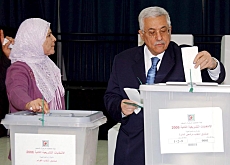
Swiss call for Palestinian government of unity

As Palestinians voted on Wednesday, the Swiss foreign ministry told swissinfo that the democratic process needs the support of all political factions.
Spokeswoman Carine Carey said she welcomed the Palestinian Authority’s view that Islamist militant group Hamas should only be allowed to share power if it renounces violence.
Prior to the elections Israel said that future peace negotiations could be put in doubt if Hamas joins the government. The United States has also voiced its concern.
Switzerland has sent a team of short- and long-term observers to the Palestinian territories to monitor the election as part of a European Union mission.
Two Swiss parliamentarians are also taking part in the Council of Europe’s own observer mission.
swissinfo: How does the Swiss government view the Palestinians’ first parliamentary election in a decade?
Carine Carey: The Swiss foreign ministry is pleased that the election has been able to take place despite the security situation. We welcome the fact that [Palestinian President] Mahmoud Abbas did not give in to internal pressure to delay the vote. The last elections took place almost exactly ten years ago, so it is important that the Palestinian Authority now gets a new democratic legitimacy.
We also welcome the decision by the Israeli government to allow the elections to take place in East Jerusalem, which according to humanitarian law is a part of the occupied territories. We hope that the Palestinian people in East Jerusalem are able to make use of their right to vote.
swissinfo: How will Switzerland deal with the Palestinian Authority if Hamas forms part of the new government?
C.C.: The foreign ministry is in favour of bringing all the political parties into the democratic process. Whatever happens, international law as well as the Oslo peace accords, which recognise Israel’s right to existence, must be binding for the Palestinian Authority. The way in which these basic principles are adhered to will shape our bilateral relations with the Palestinians.
swissinfo: The EU has threatened to withdraw financial support for the Palestinians if Islamist militant groups are voted into office. Would Switzerland follow suit?
C.C.: The Swiss government supports – almost without exception – projects run by international organisations and local non-governmental organisations. The one exception is the Palestinian Statistics Office, which is supported by the Swiss Agency for Development and Cooperation. Since the Palestinian Authority does not receive any direct financial support from Switzerland, this particular question is not really relevant.
swissinfo: Does Switzerland consider Hamas to be a terrorist organisation or a political movement?
C.C.: With the exception of [Osama bin Laden’s] al-Qaeda network, which has been banned in Switzerland since November 2001, Switzerland has not forbidden any organisation or group as such. On the other hand we do monitor individuals who break the law, and that includes anyone engaged in terrorist activity.
When it comes to Hamas we are talking about an organisation which on the one hand is active in society and which as a result of its activities has gained strong political support. On the other hand it claims the right to armed opposition.
Humanitarian law forbids the use of violence against civilians and Switzerland has always pushed for a peaceful resolution to the conflict. If Hamas wants to join the government it will have to accept the basic principles laid out under the terms of the Oslo peace accords. Switzerland welcomes Abbas’s declaration that members of Hamas will only be allowed to join the Palestinian government if they accept the Oslo accords with Israel.
swissinfo: How does Switzerland see the political situation in the Middle East developing following the Palestinian election and the departure of Israeli Prime Minister Ariel Sharon from the political scene?
C.C.: It is still too early to predict what might happen. The Israeli parliamentary elections on March 28 will be very important for the future development of the Middle East conflict and for the peace process as a whole. But it is encouraging that both the interim Israeli prime minister, Ehud Olmert, as well as the Palestinian president, Mahmoud Abbas, have spoken out in favour of a speedy return to the negotiating table.
swissinfo-interview: Tamer Aboalenin
Swiss involvement in Israel and the occupied territories primarily consists of development aid for the Palestinians.
This is routed through non-governmental and other international organisations. No direct funding is given to the Palestinian Authority, apart from a subsidy to the statistical office.
A Swiss-backed peace plan unveiled two years ago – the Geneva Iniative – has so far failed to win political support on either side.

In compliance with the JTI standards
More: SWI swissinfo.ch certified by the Journalism Trust Initiative















![The four-metre-long painting "Sonntag der Bergbauern" [Sunday of the Mountain Farmers, 1923-24/26] had to be removed by a crane from the German Chancellery in Berlin for the exhibition in Bern.](https://www.swissinfo.ch/content/wp-content/uploads/sites/13/2025/12/01_Pressebild_KirchnerxKirchner.jpg?ver=f05a5a9c)














You can find an overview of ongoing debates with our journalists here . Please join us!
If you want to start a conversation about a topic raised in this article or want to report factual errors, email us at english@swissinfo.ch.